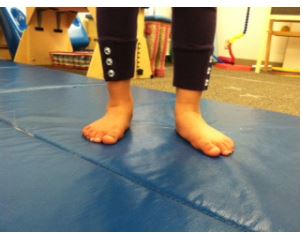Physical Therapy Corner: 'Lazy' Feet
 by Stacy Menz, DPT, Board Certified Pediatric Clinical Specialist
by Stacy Menz, DPT, Board Certified Pediatric Clinical Specialist
One of the things I love being a pediatric physical therapist is when my friends ask me questions about their kids. I’m sure many may think that’s odd but I love that it challenges me to think and problem solve. Added to the challenge is that often, my friends live no where near me so I’m getting their descriptions of what their child is or isn’t doing or I’m getting videos of their kids. I’m not sure how we ever lived without technology!
A recent question was about running. My friend noticed that sometimes her son ran ‘fast’ and other times he ran slow and awkward. I had her send me some videos and while I may not know exactly what is causing the challenges with her son, I was able to relate it to some things we’ve seen with kids in the past.
Now I’m making up this term so don’t try to look it up, but kids can have ‘lazy’ feet. They aren’t engaging their feet and ankles when they are walking or running. This can cause toes to drag, or them not to have push off, or any other type of ‘odd’ movement pattern. Now there are kids that have challenges with this because of a physical challenge and that may be a slightly different story.
For kids that just aren’t engaging their calves when they walk or run, they aren’t getting the push off that initiates the swing phase of their walking or running and they lose the propulsion that can set them up to move quickly or smoothly. In addition, without activating the push off, often they won’t maintain activity in their ankle muscles causing their foot to look floppy as they walk, and possibly cause their toes to drag or their foot to slap down on the ground.
There is no sure fire way to fix this but we work a lot on leaping from one foot to the next, jumping up into the air and emphasizing push off, and telling them to take longer steps (using spots or markers on the ground is a great way to encourage this). Each kiddo is going to be different but if you think your child needs a little boost to their running, help them to wake up their calves and other foot/ankle muscles. They can also walk on their heels, walk on their toes, hop on one foot, etc. After doing this have them practice running. Also, if you play ‘chase’ you may see their form improve because they are trying to run faster which can encourage longer strides and an improved push off.
Also, you will see better form on a firm surface than if they are on sand or in long grass. So start on a track or road/sidewalk and then progress to the more challenging surfaces like the beach or your yard (unless your grass is cut really short). Also, wearing running shoes or bare feet will potentially show better form than looser fitting shoes like clogs or flip flops.
I just thought it would be fun to share some observations that I’ve noted and see what others think on the subject.
Featured Guest Columnist: Stacy Menz, DPT, Board Certified Pediatric Clinical Specialist
Stacy, Starfish Therapies’ founder, is a pediatric physical therapist with both a Masters and a Doctorate in Physical Therapy from Boston University and is a board certified pediatric clinical specialist. She stumbled into this field when she realized she would get to play with kids all day long! In reality, she loves making a difference in the lives of kids and their families. In addition to doing rehabilitative work with kids, she also promotes overall wellness and prevention of developmental delays through education. Stacy is actively involved in her professional organizations and is on the editorial board of Impact, the publication of the Private Practice Section of the APTA, and serves on the education committee of the Pediatric Special Interest Group for the California Physical Therapy Association. Stacy and her colleagues are also actively involved in research and have an article submitted for publication.
Please support our contributing authors and visit Starfish Therapies
PediaStaff is Hiring!
All JobsPediaStaff hires pediatric and school-based professionals nationwide for contract assignments of 2 to 12 months. We also help clinics, hospitals, schools, and home health agencies to find and hire these professionals directly. We work with Speech-Language Pathologists, Occupational and Physical Therapists, School Psychologists, and others in pediatric therapy and education.
